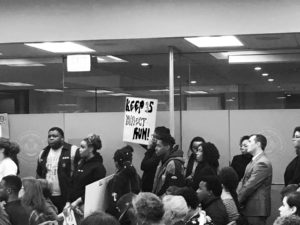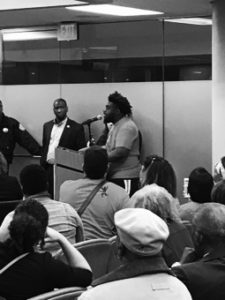
By Dylan Borne
They Demand: “Arrest the Board!”
On December 20th, 200 parents, teachers, and students packed the Orleans Parish School Board (OPSB) meeting to demand that McDonogh 35 Senior High School remain direct-run by the Board. They exposed the OPSB for intentionally letting McDonogh 35 fail so that a for-profit charter corporation could take it over.
“The School Board is coming as a business man. It’s not that they don’t know what they’re doing, it’s that they don’t care… OPSB has never raised an arm or eyebrow to their word, they shy away from it” –Alex, parent
“We’ve been told so many untruths, the word ‘lie’ isn’t strong enough… Pres. Trump has a better track record.” –Woodson, McDonogh class of ’85 graduate
Statement from youth organization Rethink New Orleans: “Equitable education for all young people to stand in solidarity with all students in New Orleans, and we want to make sure we keep McDonogh 35 direct-run”
“The police officers around here remind me of the charter I went to… y’all prepared us more for prison than anything else… for me this is life or death” –Antonio Travis, Black Man Rising
“Any school district worth its salt would jump at the opportunity to work with parents that are this involved… don’t say it’s about children if you don’t respect the voices of their parents”—G 2 Brown, Journey 4 Justice Alliance
“The time for us pleading, begging crying is over, the time now is to fight… we’re gonna recall the entire board. They refuse to listen to children, parents, and community. We’re done. We’re done begging and making our case. We sent them reports, we sent them data, we had people from Chicago come and talk about what happened to them, we’ve done it all. So if you’re still not listening, it’s over…we don’t wanna wait until it’s time to vote.”—Ashana Bigard, Families and Friends of Incarcerated Children
Paid representatives of Inspire NOLA, the Louisiana Association of Public Charter Schools, and other pro-charter organizations tried to make speeches. Audience members drowned them out with boos and chants. Parents and youth yelled “Whose Schools? Our Schools!” and “Arrest ‘em and do the time it took to make ‘em!”

